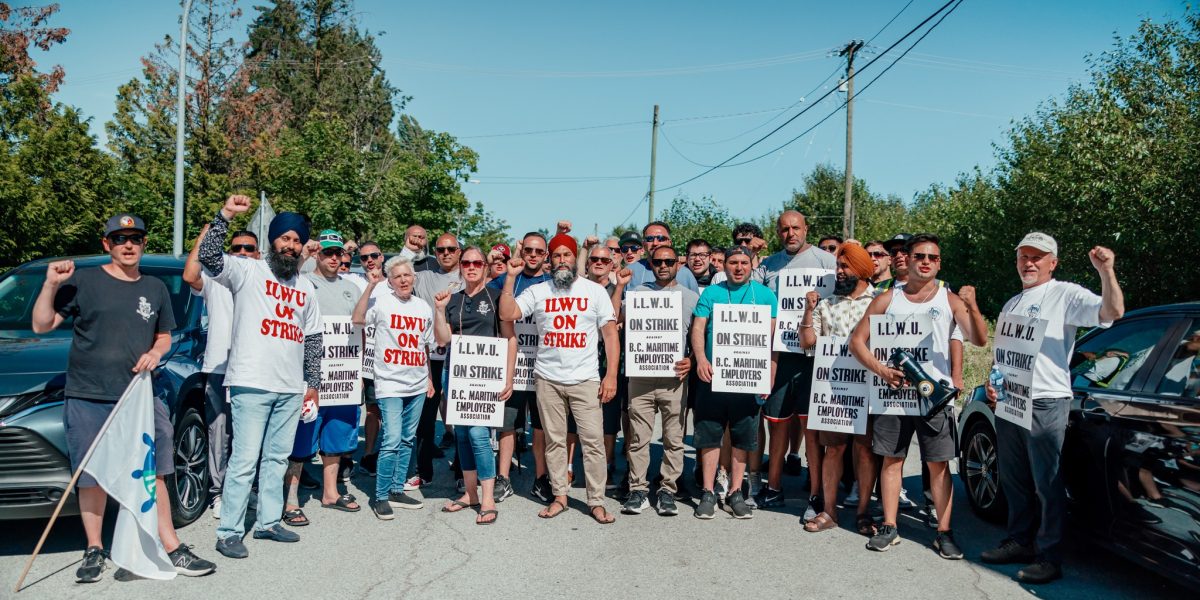On Saturday, July 1, over 7000 dockworkers, members of the International Longshore and Warehouse Union (ILWU) in British Columbia, walked off the job after a resounding 99.2 percent strike vote. The strike affects 35 different terminals, including those at the two major ports in BC, Vancouver and Prince Rupert.
The union has highlighted three main concerns that have yet to be addressed by management at the bargaining table: protection from job losses due to automation, protection from contracting out, and adequate wage increases to combat the high cost of living. While the employer’s bargaining agent, the British Columbia Maritime Employers Association (BCMEA), has unsuccessfully tried to drive a wedge between Longshore workers and others by highlighting their above-average salaries and recent (modest) pay increases, the union has made it clear that these are a pittance when compared to the record profits made by the employers in the past few years of the pandemic. The employers and the BCMEA have actually been pushing for concessions at the bargaining table, something they have of course neglected to mention when talking to the press.
Back-to-work legislation: the rough waters ahead
Because the longshore workers’ strike has such a big economic impact—one third of Canada’s international trade passes through the Port of Vancouver alone—business has wasted no time in calling for back-to-work legislation. “The federal government must stay out of our business,” ILWU Canada President Rob Ashton warned the Federal Liberals on Sunday. “If the BCMEA gets their way, and their way is to let the (federal) government make the collective agreement for them, there will never be labour peace on the waterfront.”
So far, the Federal Liberals have stated that they won’t intervene in the strike, publicly affirming the need for the dispute to be resolved at the bargaining table, but their tune could easily change if they feel too much pressure from business. Back-to-work legislation and forced arbitration to end the strike are definitely possibilities.
Solidarity can beat the bosses and the laws
If ILWU members are legislated back to work, what would it take for them to defy that order? Like the postal workers, the ILWU has a history of militancy, but nevertheless, defying back-to-work legislation is not something workers do lightly. The threats of huge fines are usually enough to prevent unions from breaking the law. Successfully defying that kind of legislation is something that would require building an active rank and file network that includes not just ILWU members, but other community and union activists.
We saw the beginnings of what that might look like in the Ontario Paint the Province Purple movement that gave education workers the confidence to strike illegally against Doug Ford’s cuts, and to force his government to back down on his draconian back-to-work legislation. That kind of active solidarity movement is definitely something to aspire to!
While we may not have a ‘Paint the Province Purple’ movement here in BC, showing solidarity for striking dockworkers can still make a difference in their fight. As a teacher who has been on several strikes, both legal and illegal, I know that the picket line solidarity visits from community and union members made a big difference to my co-workers and myself. When the mainstream media tells you that everyone is against you, it’s great to see concrete evidence that this is not the case.
ILWU members are showing their resolve in their fight against their employer. But if the government decides to legislate them back to work or enforce arbitration, it will take all of us to show the ruling class that we fight to win—all of us building solidarity together, starting now. If you are in BC and can make time to visit a picket line near you, you can help build support for the ILWU strike by visiting, taking a photo, and sharing it on social media with the hashtags #ILWU #ILWUCanStrike and #BCLab (BC Labour). Together, we can show dockworkers that we stand with them in their fight—no matter what they have to do to win.
You can visit one of many picket line locations: in North Vancouver at any of the port locations such as Neptune Terminal, 1001 Low Level Road North Van. or Pembina Terminal at 1995 West First St., North Van., or at Deltaport, 2 Roberts Bank Way, Tsawwassen. Picket lines are up at port terminals in many towns in BC.
Photo courtesy of ILWU Canada on Facebook: https://www.facebook.com/ILWUCanada.
Did you like this article? Help us produce more like it by donating $1, $2, or $5. Donate

